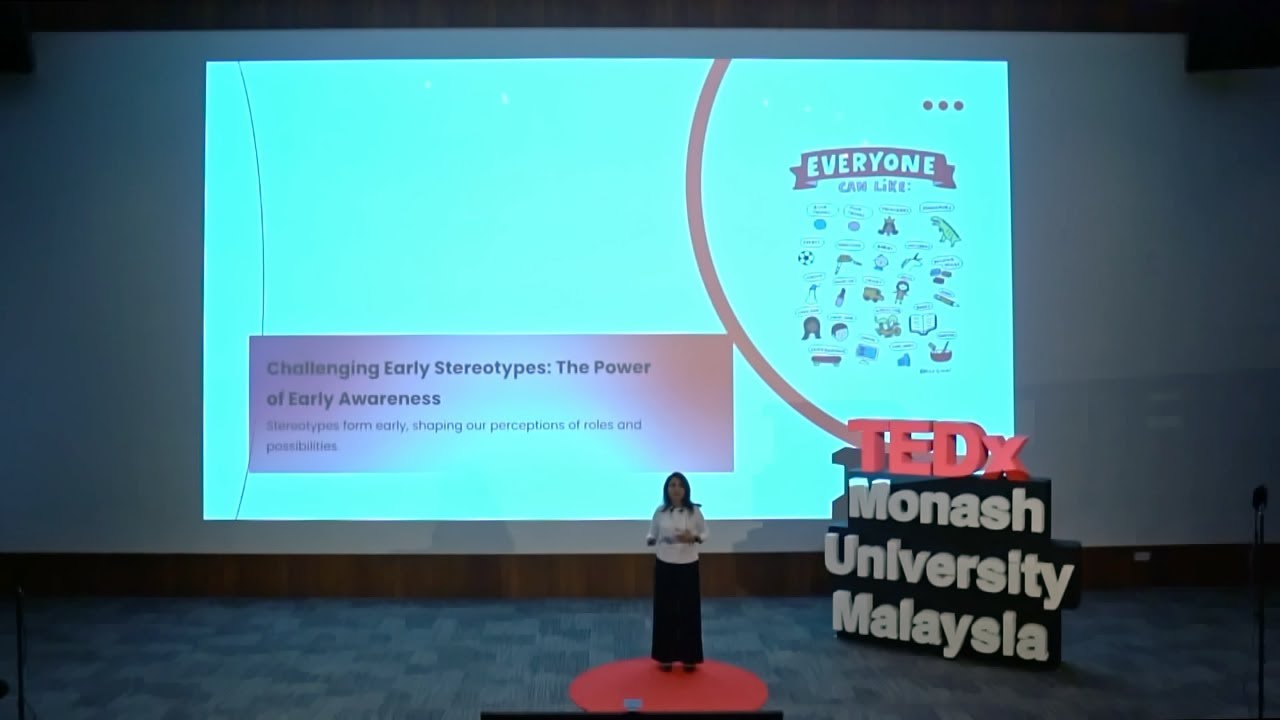Ruby addresses the myth of the glass ceiling in the corporate world, arguing that the real challenge for women lies in overcoming the stereotypes and systemic biases encountered at the beginning of their careers. She emphasizes that these early biases, referred to as the 'broken rung' on the leadership ladder, hinder women's ascent to managerial roles much more than the metaphorical glass ceiling that is often discussed. These stereotypes start early in life, impacting women's roles and self-perceptions even before entering the workforce.
Ruby shares her personal experiences and observations of gender-based stereotypes, underscoring how they shape women's ambitions and opportunities differently from men. She discusses how women, like her former female manager, often face harsher judgments than their male counterparts and how this disparity is fueled by deep-rooted cultural biases that question women's leadership styles and potential. Ruby asserts the necessity for organizations to recognize and repair the broken rung by creating equitable pathways for leadership development and providing mentoring opportunities.
Main takeaways from the video:
Please remember to turn on the CC button to view the subtitles.
Key Vocabularies and Common Phrases:
1. stereotypes [ˈstɛrioˌtaɪps] - (n.) - Widely held but fixed and oversimplified images or ideas of a particular type of person or thing. - Synonyms: (clichés, generalizations, assumptions)
Now, stereotypes often take root in the earlier stages of our lives.
2. systemic biases [sɪsˈtɛmɪk ˈbaɪəsɪz] - (n.) - Discrimination embedded in the systems of society that favor certain groups over others. - Synonyms: (institutional bias, structural prejudice, ingrained inequality)
This broken rung is where stereotypes and systemic biases take hold.
3. trajectory [trəˈdʒɛktəri] - (n.) - The path or progression of development towards an outcome. - Synonyms: (course, path, direction)
This is a critical stage in any career because it sets the trajectory for future advancements.
4. dismissed [dɪsˈmɪst] - (v.) - To be regarded as unworthy of consideration. - Synonyms: (overlooked, disregarded, ignored)
Women in leadership are often judged harshly than men, with their successes too often dismissed as luck rather than skill.
5. predefined [ˌpriːdɪˈfaɪnd] - (adj.) - Established or decided in advance. - Synonyms: (predetermined, preset, fixed)
...to embrace a future that seemed predefined by our gender.
6. assertive [əˈsɜrvɪv] - (adj.) - Having or showing a confident and forceful personality. - Synonyms: (confident, emphatic, self-assured)
But in a leadership role, being assertive is a value that you need.
7. mentoring [ˈmɛntɔrɪŋ] - (n.) - The process of advising or training someone, especially a younger colleague. - Synonyms: (guidance, coaching, tutoring)
Ensuring equal access to leadership opportunities, and actively mentoring women to prepare them for these roles.
8. resilience [rɪˈzɪljəns] - (n.) - The capacity to recover quickly from difficulties. - Synonyms: (fortitude, perseverance, endurance)
Fostering resilience and innovation.
9. thrive [θraɪv] - (v.) - To grow or develop well, or to be successful. - Synonyms: (flourish, prosper, succeed)
...an environment where everyone can thrive.
10. inclusion [ɪnˈkluʒən] - (n.) - The practice or policy of including people who might otherwise be excluded or marginalized. - Synonyms: (integration, incorporation, embracement)
This requires a commitment to diversity, inclusion at every level of the organisation.
Myth Of The Glass Ceiling - Women In The Corporate World - Ruby Kaur - TEDxMonashUniversityMalaysia
Hi, everyone. I'm Ruby, and I'm here to speak to you about the myth of the glass ceiling. But before I start, just like Siti Kasim, I'm also a Buddha kampongen. And I also didn't have a sponsorship from my mafa. So I had to work full time and study part time to get myself into the corporate world. So today I want to speak to you about women in the corporate world and the myth of the glass ceiling.
So, in the corporate world, we often hear about the glass ceiling, this invisible barrier that women have to break through to reach the leadership positions. But what if I told you that the real challenge for many women isn't the glass ceiling, but something much earlier than their careers? So, according to this recent study by Mackenzie and company, the most significant obstacle to a woman's advancement is the broken rung on the ladder of leadership. This broken rung is where stereotypes and systemic biases take hold. Long before women get close to leadership roles.
Now, stereotypes often take root in the earlier stages of our lives, now shaping the way we perceive our roles and possibilities long before we enter the workforce. These ingrained beliefs can be powerful, invisible barriers that limit our aspirations and potential. So me. Growing up as the youngest of four siblings, I witnessed this firsthand. So while my brother and my male cousins were encouraged to explore the world around them, they were playing football, climbing trees, and chasing their curiosities. My sisters and I were often steered towards more traditional roles.
We were expected to help with the household chores, to be more reserved, and to embrace a future that seemed predefined by our gender. So these early experiences weren't just fleeting moments. They were foundational lessons in what was expected of us as girls. For the boys, the message was clear. The world was there to go, explore and conquer. But for the girls and everyone around me, the message was very different. Our place was within certain boundaries dictated by tradition, expectations, and labels.
But here's the thing. These stereotypes, while powerful, are not unchangeable. Once we become aware of these barriers, we can begin to challenge and dismantle them. We can question the roles we've been assigned, push back against the limitations imposed on us, and redefine what's possible. So awareness is the first step, and with it comes the power to rewrite our narratives.
So when women enter the workforce, the impact of these early stereotypes becomes even more pronounced. The broken rung of the ladder is where women are often held back from their first promotion to a managerial role. This is a critical stage in any career because it sets the trajectory for future advancements. So let's go back to the McKenzie report. For every 100 men promoted from entry level to managerial roles, only 87 women achieved the same promotion. The issue here isn't ambition. Women are just as eager to climb the corporate ladder as men. The problem is bias. So men are often promoted for their potential, their future potential, while women are judged more strictly on their current performance, making it harder for them to advance in their early careers.
When I first entered the workforce, I saw this issue up close. My first job at Messinaga had me working under a female manager, the only woman amongst the team of men. And despite her relentless hard work and commitment, she was always required to prove herself. Now this is part of a larger problem. Women in leadership are often judged harshly than men, with their successes too often dismissed as luck rather than skill.
Just to give you an example, the manager that I'm speaking about, everyone perceived her as aggressive. But in a leadership role, being assertive is a value that you need. But when men are assertive, it's looked at as a leader, but when women become assertive, people look at them as aggressive. Get judged. So you got to remember how you portray yourself. You can be clear about what you want, you can be aggressive, but you also have to understand that you will be judged. So how do you actually show yourself in a professional manner?
So in some sense, organizations need to be aware of this broken rung and take actionable steps to fix it. This means creating transparent pathways for advancement, ensuring equal access to leadership opportunities, and actively mentoring women to prepare them for these roles. So it's not just about fixing the system, it's about changing the narrative around what leadership looks like.
So rewriting the narrative of leadership. Right. So as leaders, it's our responsibility to rewrite the narrative around stereotypes. True leadership isn't just about breaking through the glass ceiling yourself, its about making sure the ladder is strong for those who follow. This requires a commitment to diversity, inclusion at every level of the organisation. It means pulling out a seat at the table for others, challenging biases and fostering an environment where everyone can thrive.
So how do we start to rewrite this narrative? First thing is, speak up. Sometimes that's all it takes. Often people don't realize they're stereotyping until it's pointed out. Address it, ask for what you need, and if you don't get a positive response, decide if you still want to be in that environment.
I've come from a background where I wasn't expected to be where I am today. Yes, I've worked hard and I've struggled. But I've also challenged many stereotypes. So along the way, I also had a lot of support. So don't be afraid to ask for help or to take on daunting challenges. It's not about the titles or the money, it's about your own self worth. So as we break these stereotypes, let's remember to check our own biases as well as we can easily fall into stereotyping ourselves.
So leading by example is another powerful way to drive change. Just as I've learned to balance speaking up with collaboration, demonstrating inclusivity, and also fairness in our actions, it makes a significant impact. It's about living our values every day and setting a positive example for others to follow. Leadership is about walking the talk and creating a supportive workplace where everyone feels valued.
So embracing challenges is also crucial for growth. Facing difficulties head on, rather than avoiding them, helps us to learn and advance. It pushes us out of our comfort zone, fostering resilience and innovation. By tackling these challenges with determination and a positive attitude, we inspire others and pave the way for real progress.
Encouraging confidence is also key to a thriving environment, so trusting in others abilities and showing support helps them to rise to their potential. Confidence grows from positive reinforcement and celebrating achievements, so providing opportunities and acknowledging efforts, we build self belief and motivation.
So how do we inspire future generations? Inspiring future generations means breaking stereotypes and creating new possibilities. By challenging norms and setting an example, we show what's possible beyond traditional boundaries. So share your journey. Encourage others like what we are doing today. Help create a more inclusive environment. Our efforts today inspire the next generation to envision and pursue their own paths, free from outdated limitations.
Let's be role models who empower others to dream big and break new ground. I hope the next generation of women, men, and everyone here today will push forward, make bold choices, and build a future where stereotypes no longer hold us back. So we all have the power to break the stereotypes and fix the broken rung. By doing so, we not just advance ourselves, we create a new path for the women who come after us. Let's make sure that when they look up, they see not a glass ceiling, but they see a clear sky full of possibilities. Thank you.
Leadership, Inspiration, Education, Gender Equality, Corporate World, Systemic Bias, Tedx Talks


